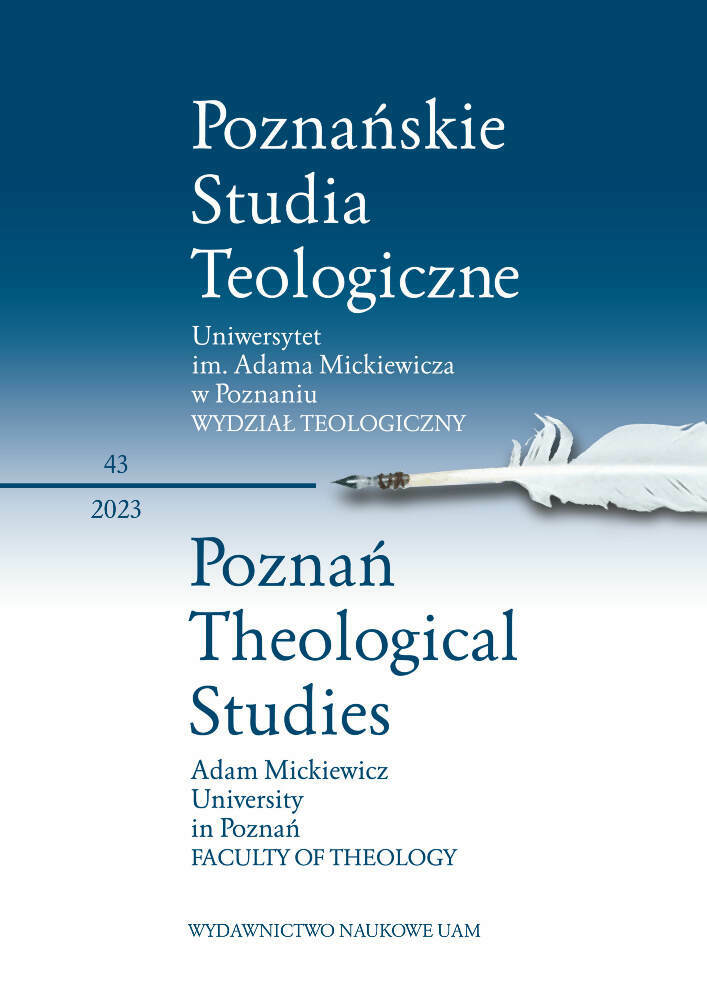Abstract
Among the New Testament writings, there is a very short letter (3 John), traditionally attributed to the apostle John, which is almost entirely devoted to the theme of Christian hospitality, even towards strangers, who, thanks to the warm openness of Christians, become their guests. It is this idea which is the subject of the study in this article. After basic information about the sender and addressee of the letter, the passages containing Gaius’ praise of hospitality towards his brothers are analysed (1:5.6.8). Although in the first instance, recommended hospitality refers to Christian brothers, including those strangers, i.e. those not personally known to Gaius, who set out to preach the Gospel, the letter also advises an equal attitude towards any strangers (including non-Christians). This has an important evangelistic significance, because due to the Christian hospitality they can concretely experience God’s goodness and recognise in the disciples of Jesus the followers of God Himself, who is the Father of all people.
References
Barton S.C., “Gościnność” [in:] Słownik późnych ksiąg Nowego Testamentu i pism Ojców Apostolskich, ed. R.P. Martin, P.H. Davids, ed. pol. J. Kręcidło, trad. A. Czwojdrak et al., Warszawa 2014, p. 295–301.
Bentoglio G., Itinerant missionaries of the church of the origin and evangelization: the challenge of welcome and hospitality, “Revista Interdisciplinar da Mobilidade Humana” 17 (2009) 32, p. 193–212.
Birge M.K., The Significance of Early Christian Hospitality: The Evidence in 2 and 3 John, “The Bible Today” 56 (2018) 5, p. 293–299.
Bosak C., Słownik – konkordancja osób Nowego Testamentu, Poznań 1991.
Brown R.E., The Epistles of John: Translated with Introduction, Notes and Commentary, Garden City 1982. DOI: https://doi.org/10.5040/9780300261936
Cornillon J., Tout en commun? La vie économique de Jésus et des premières générations chrétiennes, Paris 2020.
Danesi G., Garofalo S., Migrazione e accoglienza nella Sacra Scrittura, Padova 1987.
Fabris R., La casa-Chiesa negli Atti degli Apostoli [in:] Chiesa domestica. La Chiesa-famiglia nella dinamica della missione cristiana, a cura di R. Fabris, E. Castellucci, Milano 2009, p. 41–74.
“Gościnność” [in:] L. Ryken, J.C. Wilhoit, T. Longman III, Słownik symboliki biblijnej, ed. pol. W. Chrostowski, trad. Z. Kościuk, Warszawa 1998, p. 223–226.
Hanelt T., Pojęcie „przybysza” (ger) w Starym Testamencie, “Studia Gnesnensia” 3 (1977), p. 29–51.
Jobes K.H., 1,2 & 3 John, Grand Rapids 2014.
Keener C.S., Komentarz historyczno-kulturowy do Nowego Testamentu, ed. pol. K. Bardski, W. Chrostowski, trad. Z. Kościuk, Warszawa 20002.
Klauck H.-J., Lettere di Giovanni, trad. C. Esposto, Brescia 2013.
Leonhard B., Hospitality in Third John, “The Bible Today” 25 (1987) 1, p. 11–18.
Mędala S., Gościnność chrześcijańska (Trzeci List św. Jana) [in:] Ewangelia św. Jana. Listy Powszechne. Apokalipsa, ed. R. Bartnicki et al., Warszawa 1992, p. 97–101.
Ollrog W.-H., Paulus und seine Mitarbeiter. Untersuchungen zu Theorie und Praxis der paulinischen Mission, Neukirchen-Vluyn 1979.
Ostański P., Historiozbawcza wizja starości z Piśmie Świętym. Studium egzegetyczno-teologiczne, Poznań 2007.
Penna R., Lettera ai Romani, vol. III: Rm 12–16, Bologna 2008.
Perkins P., Listy Janowe [in:] Katolicki komentarz biblijny, ed. R.E. Brown, J.A. Fitzmyer, R.E. Murphy, ed. pol. W. Chrostowski, trad. K. Bardski et al., Warszawa 2001, p. 1522–1536.
Podeszwa P., Gościnność wobec „obcych braci” w świetle 3J, “Biblica et Patristica Thoruniensia” 9 (2016) 2, p. 71–85. DOI: https://doi.org/10.12775/BPTh.2016.015
Popielewski W., Gościnność w ikonach i nakazach biblijnych [in:] Hospitalitas consecrata, ed. K. Wójtowicz, Kraków 2003, p. 38–55.
Pytel J.K., Gościnność w Biblii. Studium źródłowo-porównawcze, Poznań 1990.
Simoens Y., Croire pour aimer. Les trois lettres de Jean. Une interprétation, Paris 2011.
Simoens Y., Le tre Lettere di Giovanni. Credere per amare, trad. M. Simionati, Bologna 2012.
Stern D.H., Komentarz żydowski do Nowego Testamentu, trad. A. Czwojdrak, Warszawa 2004.
Szczerbiński W., Obcy wśród Żydów. Od partykularyzmu do uniwersalizmu [in:] Więcej szczęścia jest w dawaniu aniżeli w braniu. Księga Pamiątkowa dla Księdza Profesora Waldemara Chrostowskiego w 60. rocznicę urodzin, ed. B. Strzałkowska, vol. III, Warszawa 2011, p. 1391–1407.
Trebilco P., What Shall We Call Each Other? Part Two: The Issue of Self-Designation in the Johannine Letters and Revelation, “Tyndale Bulletin” 54 (2003) 1, p. 51–73. DOI: https://doi.org/10.53751/001c.30223
Wischmeyer O., Das Adjektiv ΑΓΑΠΗΤΟΣ in den paulinischen Briefen. Eine traditionsgeschichtliche Miszelle, “New Testament Studies” 32 (1986) 3, p. 476–480. DOI: https://doi.org/10.1017/S0028688500013710
License
Copyright (c) 2023 Paweł Podeszwa

This work is licensed under a Creative Commons Attribution-NonCommercial-NoDerivatives 4.0 International License.

